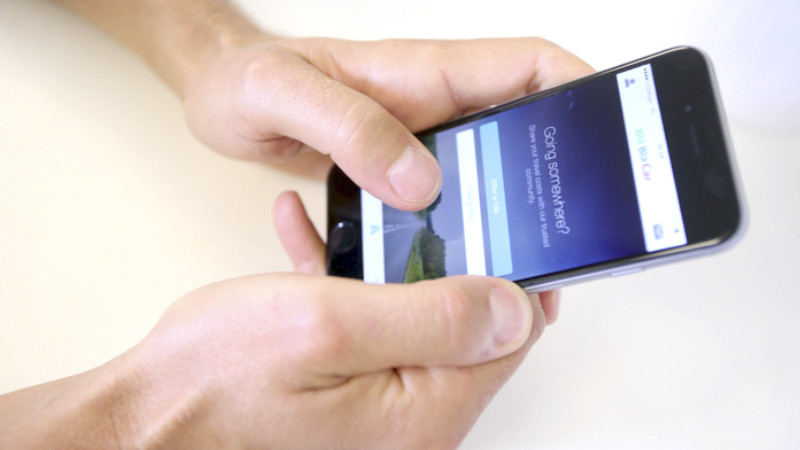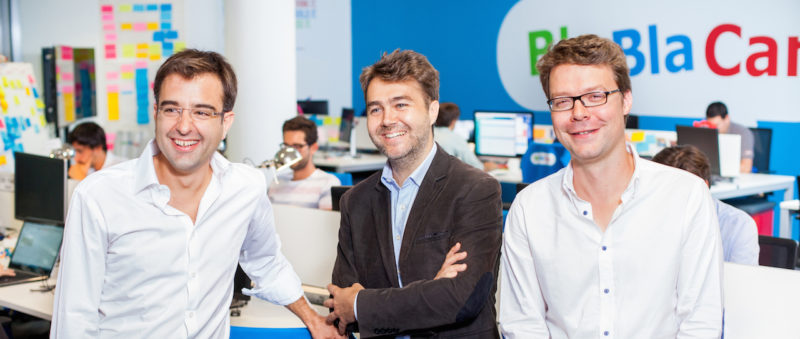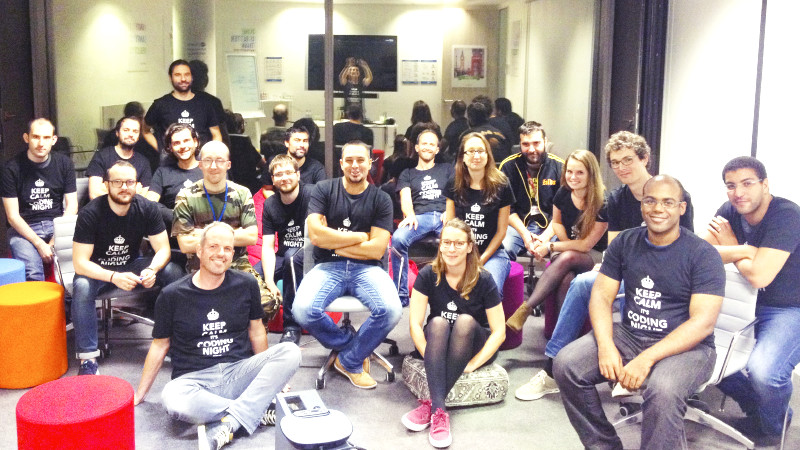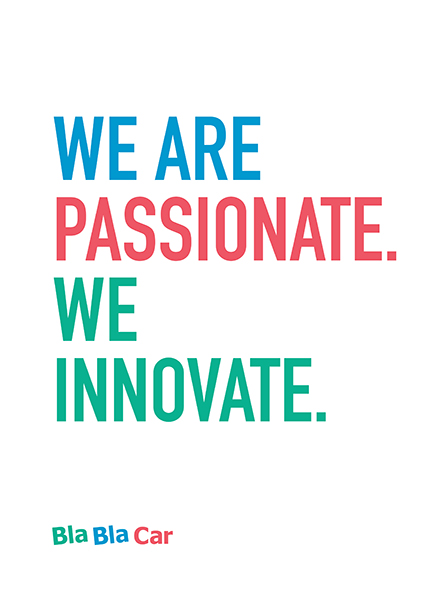Commuto (Latin) [komˈmuː.to]
Verb. To exchange something with another.
After weeks of burying himself in the Latin dictionary in search of a brand name, Fred had finally found it. Building upon his idea of connecting drivers with empty car seats to passengers looking for a ride, a project which stemmed from a personal need in 2003, Fred envisioned an online marketplace for services where individuals could exchange anything and everything from car journeys to piano lessons to cooking lessons. Shortened to a more catchier ‘Comuto’, he imagined that ‘mutos’ would become the name of the points system or online currency.
Anticipating what would become the sharing economy, Fred was already exploring the notion of scalable peer-to-peer collaboration in a pre-Facebook world. With hundreds of ideas swirling around, he honed in on his passion of bringing people together to create value out of waste by optimizing cars, one of the world’s most expensive and underused assets.

A decade later, and with a more international brand name in place, BlaBlaCar connects over 35 million people across 22 countries in 3 continents. Together with co-founders Francis Nappez and Nicolas Brusson, the founding trio have lead the charge in shaping the future of the travel ecosystem and are proud to work with over 550 employees today. It’s taken hard work, much passion and innovation over the years to get to this milestone yet the team are quick to respond in saying it’s only just the beginning of the journey. It’s this spirit which encapsulates why one of BlaBlaCar’s core values is “We are passionate, We Innovate.”
When access trumps ownership
Passion and innovation are the common thread behind today’s phenomenon of transitioning from the era of owning to the era of usage. Thanks to new technologies and digital trust tools, people are breaking free from the limits of the past and collaborating with others they don’t know but with whom have an underused asset to share. Peer-to-peer collaboration is happening at an unprecedented scale and individuals are now sharing, renting and exchanging goods, knowledge and skills like never before.
Because of this radical behavioural shift, today’s generation are less interested in traditional ownership, favoring renting or borrowing assets that suit their flexible lifestyle instead. And it makes sense. When you do the math, you’ll see that it costs more than €5,000 a year to run a car in Europe, yet 96% of the time the car is parked. When cars do move, only 2.7% of the time is spent going from A to B, often with only one person on board (meaning there are 3 empty seats). The rest of the time is spent stuck in traffic jams or looking for a parking spot. With this calculation holding true across millions of cars in many countries, it represents spendings of hundreds of billions of euros per year (4 to 10% of a country’s GDP) for an underused asset. Let that just sink in for a moment. The waste is shocking!
By optimizing cars, BlaBlaCar is creating a completely new, affordable and friendly mobility solution by matching people going in the same direction and creating trust between people who have never met before. It’s disrupting travel and creating new supply by offering up routes which were previously inaccessible through trains and busses. Over the years BlaBlaCar has exchanged closely with many thought leaders in the sharing economy and collaborative consumption world including Rachel Botsman, Robin Chase, Arun Sundararajan, Yann Algan and Lisa Gansky. Together, they’ve pioneered new ideas and continue to exchange thoughts on tomorrow’s behavioural shifts.
The power of passion
In the early days Fred had scraped together his savings and took out a loan of €70k to fund the beginnings of what would become BlaBlaCar. Together with his good friend Damien, they started coding the first version of the platform from Fred’s living room in 2004. With no money to spend and no salary earned, Fred Mazzella stayed true to his family name’s Italian roots and lived off pasta for years. When BlaBlaCar started to bring in some euros from sales of their platforms to businesses in 2008, Fred decided that instead of paying himself a salary, he would rather put the money towards hiring someone to focus on something very dear to him: communications.
Enter Laure Wagner, first employee of BlaBlaCar and today’s culture captain. Having her first interview in Francis’ kitchen, followed by drinks in a tiny bar in central Paris, the team could see she was passionate and motivated. On 4 January 2009 she officially joined the team and worked from Fred’s living room whilst tolerating his cat who’d jump on her desk everyday. In fact, she was so motivated by the project that she self-financed her role by selling B2B platforms for a year whilst building the communications plan at the same time. And so passionate that she even cashed in her old phone and bought a smartphone just so she could experience the launch of the first app in December 2009!
At BlaBlaCar, passion is what provides the stamina and perseverance needed to make an innovative breakthrough. It’s a mindset which brings optimism and the energy to be persistent in chasing success, but it’s also what keeps people grounded and the strength to be patient when things get tough. When the idea of BlaBlaCar came to fruition, the environment was simply not ripe enough for it. Instead it took five more years for a good product-market fit to take off, and for behaviours to change at scale.

Like most things in life, it also takes a little bit of luck and randomness thrown in too! The type of luck that allowed Fred to cross paths with co-founders Francis and Nicolas. Together, they leveraged upon their complementary set of skills and created an environment at BlaBlaCar where the passion continues to live and thrive, nurturing audacious innovation every day.
The day you stop innovating, you become obsolete.
Innovation is a continuous iterative and dynamic process. Conscious of that, the team constantly strive to evolve and better the platform. They actively listen to members’ feedback, anticipate future needs and introduce new product features in the quest to ease the members’ overall experience with BlaBlaCar.

To fuel the innovative mindset, each developer is allowed to work on their own innovation projects every Friday afternoon. Moreover, coding nights have become a bi-annual event at BlaBlaCar. Over a period of 24 hours, teams transform their great ideas into working projects. The idea is to encourage unlimited creativity, mix teams up and create ownership. After an intense night with pizza, each team pitches and shares their newly developed feature to the rest of the company. The winning team gets their project put on the internal road map and a “POC” (Proof of Concept) version is developed to test, measure, and analyse in real conditions with the ambition of it becoming implemented in the near future.
Innovation spurs the structural organization too. Instead of a more traditional hierarchical top-down approach, BlaBlaCar’s 10 values are what guides the team in making decisions on a daily basis. Walking through the office, you’ll see posters of ‘Done is better than perfect’, ‘Fail, Learn, Succeed’ and ‘Share more, Learn more’. Values take precedence over process and brings more autonomy and responsibility to each employee. It also encourages the team to think of creative solutions and experiment with new processes and methodologies. If and when things fail, they share their learnings with the wider team. With information being exchanged openly and frequently between teammates, more transparency exists for everyone.
Moreover, BlaBlaCar is known to take a fresh approach when it comes to growth, so much so that Nicolas has pushed hard over the years to have a dedicated “growth” team instead of a “marketing” team to ensure that all marketing activities are driven by a strong analytical approach and are not isolated from the core business. Overseeing BlaBlaCar’s international expansion, he is also an avid believer in building the biggest footprint as fast as possible. His past experience of restructuring a company during the dotcom burst in Silicon Valley has led him to strongly favour an “acqui-hire” (acquiring local teams) approach. After observing a company go from rapid growth to near bankruptcy in a matter of months, he witnessed how the acquisition of a new team brought the much needed innovation to make the company successful again. At BlaBlaCar, the “acqui-hire” model fosters collaboration and exchange, and brings together teams who share a similar entrepreneurial culture along with invaluable knowledge of new markets. To date, BlaBlaCar has acqui-hired 12 teams.
Passion and innovation go hand-in-hand
Inside BlaBlaCar, the team remains passionate. Passionate about carpooling. Passionate about bettering the world. Passionate about doing the right thing for themselves. And passionate about being innovative. After all, it’s pretty rare to be innovative without having the stamina to follow through!
